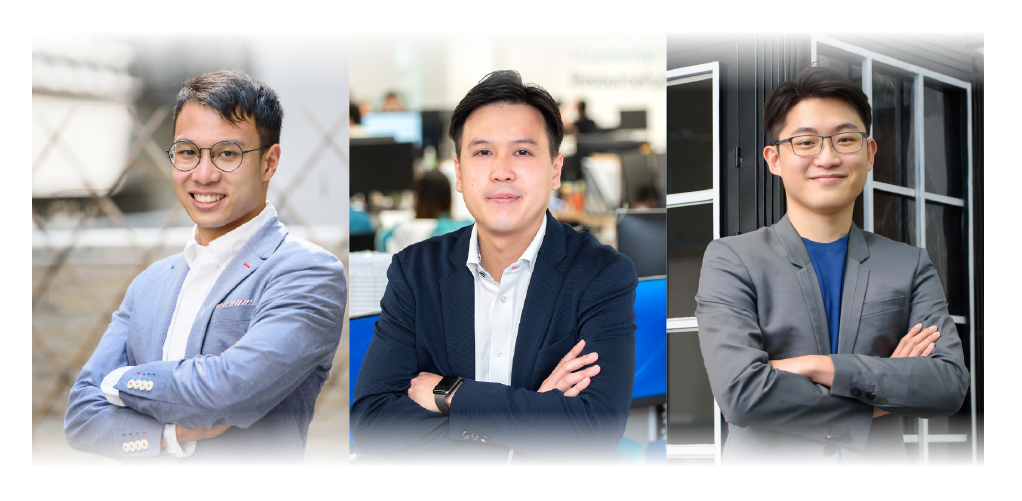As HKUST prepares to celebrate its 30th anniversary in 2021, three alumni are highlighted for their achievements in this year’s Forbes 30 Under 30 lists. We speak to them about their entrepreneurial journeys and how they have risen to the challenge of running a business in the midst of a global pandemic.
With chaos comes opportunity. And seeking out those opportunities is something that all three of the HKUST alumni featured on the Forbes 30 Under 30 lists have managed to do through their startups in the time of COVID-19.
It didn’t look good for EventXtra when the measures put in place to contain coronavirus meant social gatherings came to an end. For co-founders Angus Luk (BEng Computer Science 2012), who was named on the Forbes 30 Under 30 list, and his co-founder and fellow alumnus Sum Wong (BEng Computer Science 2013), events were their lifeblood. But with 80 per cent of their clients’ events canceled or postponed in the first quarter of 2020, it was what they call a “near-death experience” for the company.
Acting fast was critical. Angus and Sum knew that to sit there and do nothing would lead to the demise of the company. They realized that events still needed to take place, but in a different way, and began to reach out to clients to gauge interest in online alternatives. Seeing that there was demand, they started working on a virtual solution, combining their offline experience with their digital expertise. Business is now better than ever.
Winston Wong (BEng Computer Engineering 2014), co-founder of Qupital, and Timothy Ng (BBA Global Business 2016), co-founder of Spread-it, had similar experiences. Both capitalized on the fact that with various levels of lockdown enforced and more people at home, e-commerce was thriving.
When Qupital was established in 2016, it was to provide financing to SMEs struggling to secure loans from traditional banking institutions. However, last year, the company pivoted to focus on lending to e-commerce clients. Working with merchants whose sales are recorded online meant that data was already digitalized and easy for Qupital to use. “As long as we have the data, everything can be explained. We know that [our clients’] sales are still growing and performance is good, which is easy to explain to our funders,” says Winston who has seen many of his clients benefitting from the pandemic as people stay at home and shop online.
Timothy also identified e-commerce as an area of opportunity. Spread-it brings micro-influencers and brands together to promote campaigns and products. The company has worked with the likes of McDonald’s, Clinique and H&M, but with the coronavirus-induced economic downturn resulting in marketing budgets being slashed, this presented the chance for his team to research and consider new ventures.
“We’re entering into markets that we weren’t originally in, such as Key Opinion Leader (KOL) commerce. Because marketing budgets have been cut and people have more time, we have learned some things and seen that e-commerce is growing a lot, so opportunities are actually appearing while traditional ways of operation or traditional business has died down. In order to survive and grow, the key is to retain enough money and to go into an industry that you think will have a good return on your investment,” says Timothy.
While the global pandemic may have presented these HKUST alumni with new opportunities, it hasn’t always been plain sailing. The young business leaders reveal more about their journeys to entrepreneurship and what’s next on their paths to industry domination.
Angus Luk and Sum Wong, EventXtra
For EventXtra, development of the business has always been organic. Neither Angus nor Sum had really thought about launching a company, but the environment at HKUST proved conducive to starting one. The pair, who knew each other from secondary school, ended up on the same Computer Science program, helping each other with their coursework before working on their Final Year Project in 2012 together, which saw them design a location-based treasure hunting game that pre-empted Pokémon GO. Through this project they formed a team that would go on to be the foundation of the duo’s future company, a company that had its first client before it was officially established. It was only when this client asked who they should pay that Angus and Sum had to set up a company and bank account.
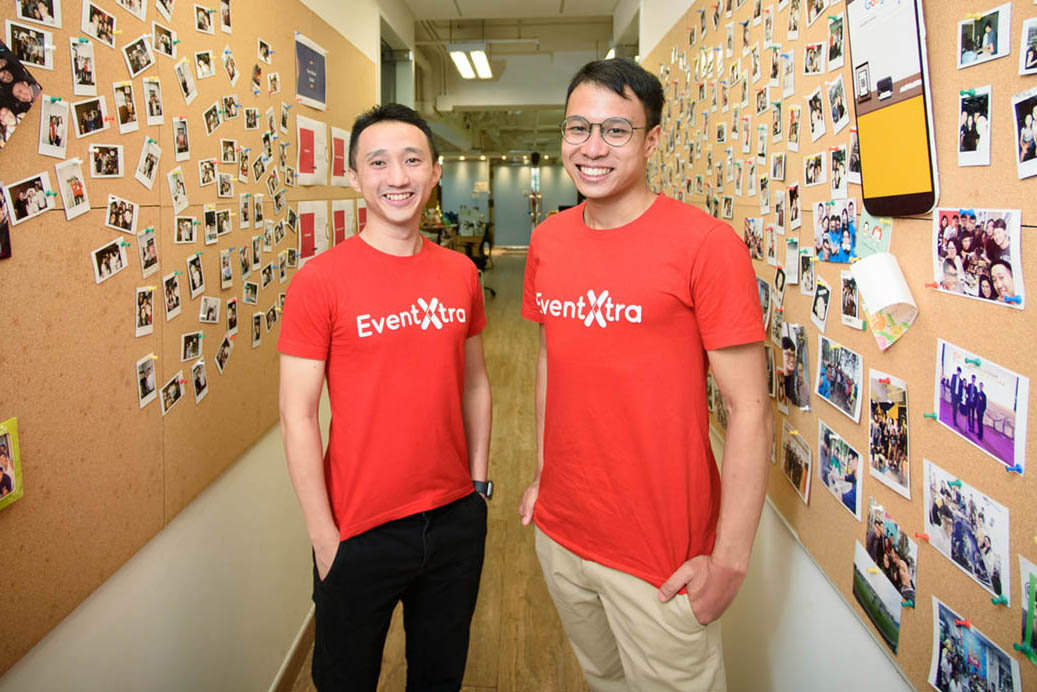
I’m proud of our relationships with our clients,” says Angus. “This is one of the reasons why when we have new products, they are happy to try them.
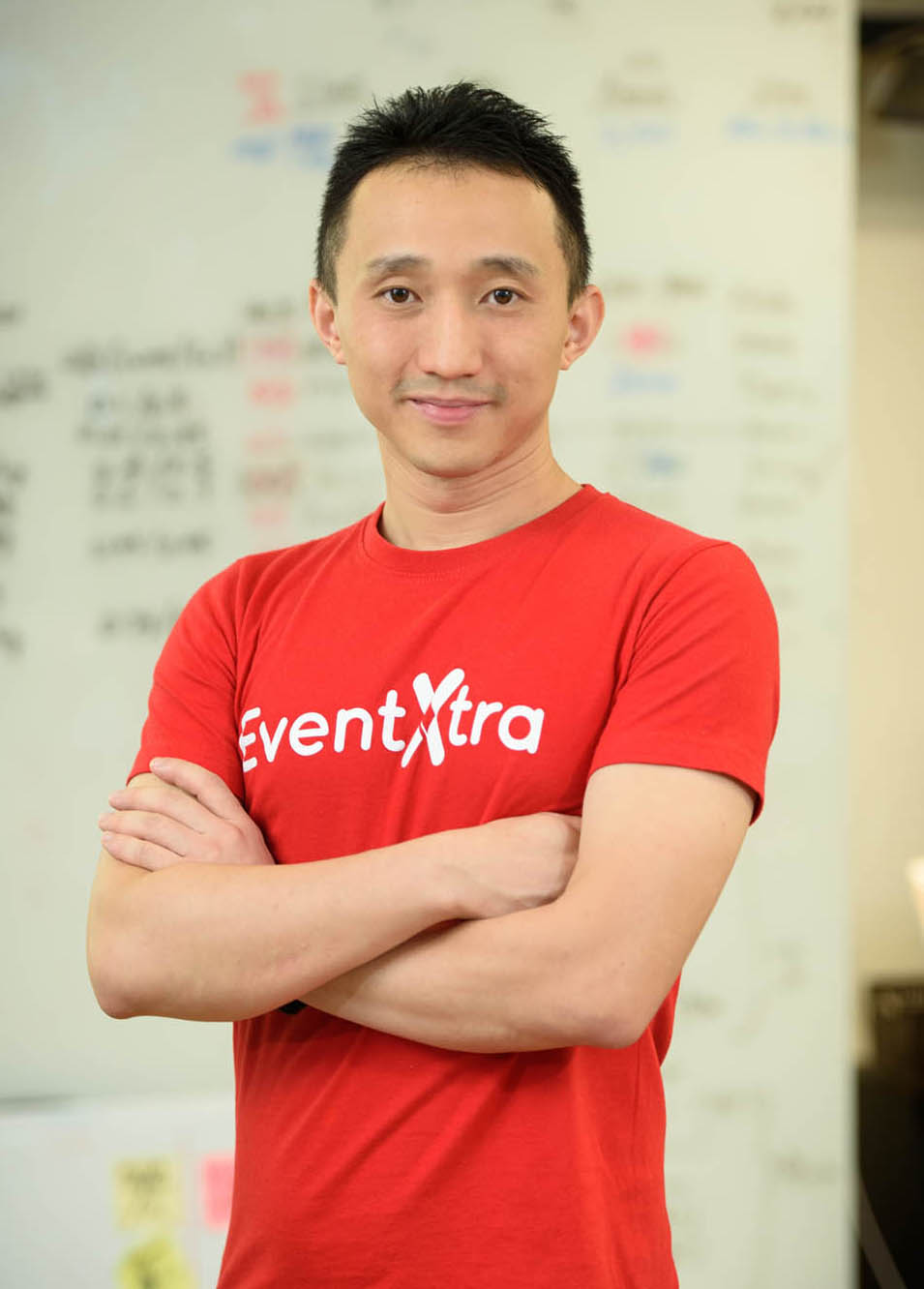
EventXtra responds to customers’ needs, and that is what has kept them alive in challenging times like the recent pandemic, which alongside events moving from offline to online, saw Angus and Sum start to offer virtual event and exhibition solutions.
“We always try to start with customers first. You build something that you already have a buyer for. For our virtual exhibition solution, we sold it before we built it.” says Sum. Once they knew what their clients wanted, they worked fast. From having the idea, to pitching it and building it, to closing their first deal, it was a mere three weeks. Now EventXtra has well over 20 clients signed up for the new product and many more from as far afield as Colombia and Brazil, as well as from Japan, China and Malaysia, knocking on their door.
The pandemic has become a catalyst for new solutions and new growth. But it has also highlighted EventXtra’s ability to be proactive and show initiative. “We emphasize initiative and focusing on what you can do instead of what you cannot change,” says Sum.
Those are traits the pair look for in employees and are characteristics that both have shown while growing EventXtra. One example they highlight was when the company started to run out of money. Self-financed at the start, when they needed to raise the first round of funding, Sum got creative. At the time there was a large IT event in Hong Kong whose website listed the names of investors who would be attending. He ran a program that predicted their email addresses and cold-emailed everyone. This strategy elicited 30 meetings and led to EventXtra raising US$1 million.
There’s seemingly never a dull moment in the EventXtra office, with challenges always presenting themselves, but the pair seem to thrive on this. “As a founder there are always new problems or new issues every day and there’s no model answer and no senior to ask advice from,” says Angus. “Every day we dig into different problems. It’s flexible and this creative way of working and problem solving is quite rewarding.” With every solution, the business continues to grow. EventXtra currently has offices in Shenzhen and Taiwan, with a total of around 30 employees, and plenty of plans to expand further. Both are proud of the company’s progress to date – Sum particularly that the business has survived through so many tough times, while Angus values the relationships that have ensured it thrives along the way.
“I’m proud of our relationships with our clients,” says Angus. “This is one of the reasons why when we have new products, they are happy to try them. Many corporates don’t want to try new things or to be the first; they want a proven track record. But through our relationship building in the past years, our clients are happy to try our new products.”
No doubt there will be more opportunities for them to do so. The event market in Asia has plenty of potential. “If you go to the US, events are much more digitalized; the experience is much more digitalized. In Asia we are still at the beginning and that’s why a lot of companies are starting to find us,” says Sum. “The goal for the company right now is to conquer the Asian market.”
Timothy Ng, Spread-it
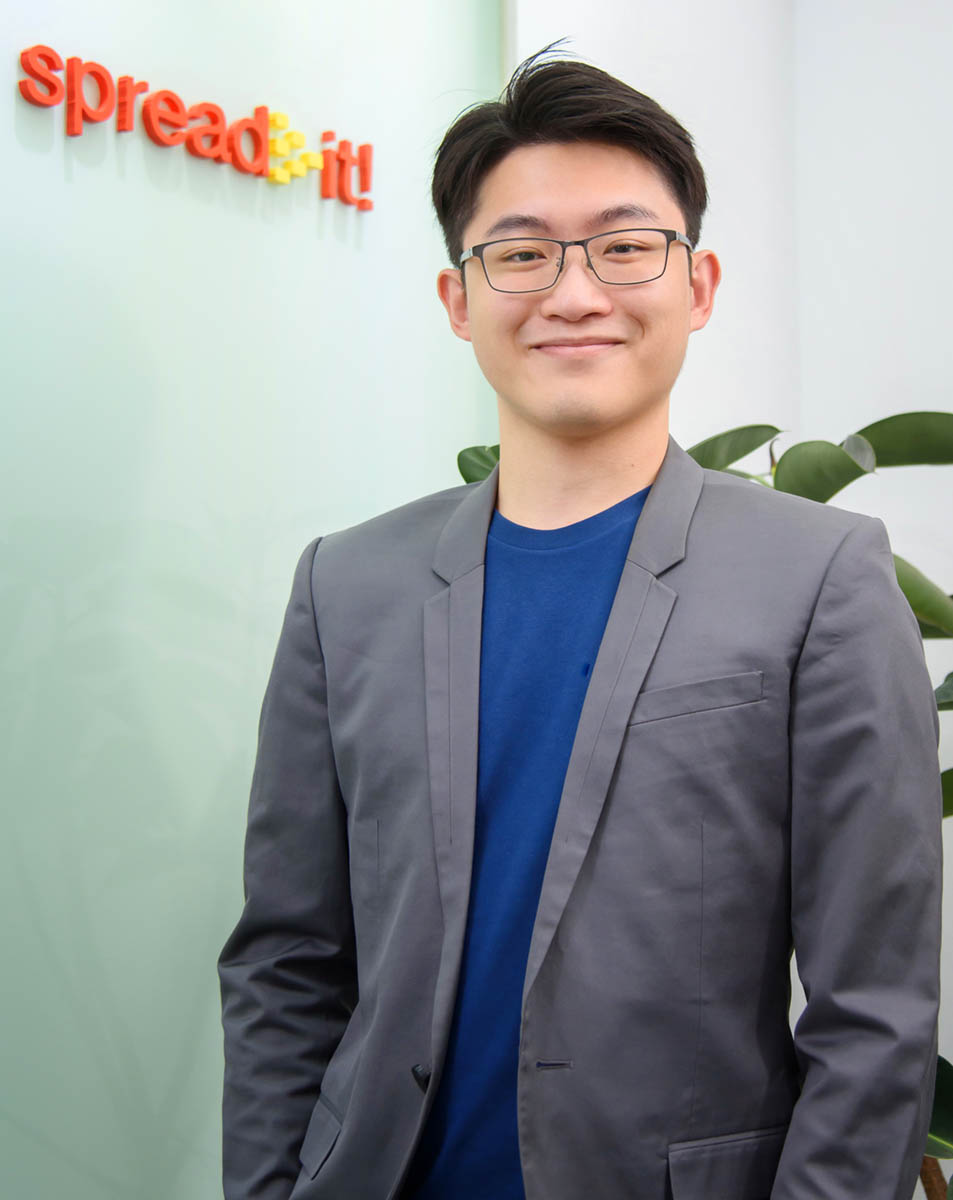
“It was always a lawyer, a doctor, an accountant. But it turned out there are much more interesting things than just being a professional,” says Timothy. This realization came to him at HKUST, and it put him on a path to becoming an entrepreneur, taking advantage of the opportunity to work at various startups as an intern, including HKUST-alumni-founded business EventXtra.
Timothy founded his inaugural business while still at HKUST. It revolved around postcards and providing opportunities for people to use them to connect. The initial business model – finding companies to pay for the postcards – didn’t work, but this didn’t stop Timothy and co-founder Winnie Lee, a graduate of the Chinese University of Hong Kong, from evolving the business model into what Spread-it has become today, Hong Kong’s largest micro-influencer platform.
But it wasn’t the first thing Timothy did after graduation. First, he went and worked at a consultancy firm for a short stint, learning how a corporate environment works and picking up skills relating to office culture, systems, financials and people management that he could bring to his own business.
Run before you learn to walk. You can stop after you have run for a while. You can grow a lot quicker.
As Spread-it was starting to take shape, Instagram began to flourish. Timothy knew from approaching sponsors for his postcard business that potential clients wanted a way to reach university students and he believed that Instagram could be a means to reach that target audience but in a more scalable and cost-effective way. And instead of using KOLs who often have upwards of 100,000 followers, as the first adopters of influencers were doing, he was of the belief that anyone can have their own influencing power. By focusing on smaller influencers, with a following of 500 to 10,000, he felt he could ensure engagement rates of up to 20% compared to two or three percent for those with large followings. He went on to develop an algorithm to select the best micro-influencers for certain brands, and Spread-it was ready to engage.
These methods proved fruitful and Spread-it now has offices in Hong Kong, Thailand, Singapore and Dubai, employing a total of around 40 people, with plans to move further into Southeast Asia. The team is young, as Timothy looks for candidates who have a growth mindset. “In an environment that is forever changing, you need to be extremely adaptive. If you have a growth mindset, you can acquire different knowledge, experiences and information and perform a lot better. There are a lot of people who after joining a particular industry, stick to it and to that role forever and become extremely experienced. But they don’t acquire different bits from different industries,” he says.
Being able to adapt in a rapidly changing environment is something that has been particularly important in recent times. With the onset of the global pandemic and the corresponding economic downturn, Spread-it identified e-commerce as an alternative market so that in addition to using influencers to collaborate with brands and engage their audiences with these brands, he could use influencers to sell goods directly. “We originally did not have any information on procurement, inventory management, supply chain management, but if you have the growth mindset you can learn it all and you don’t feel stressed out.”
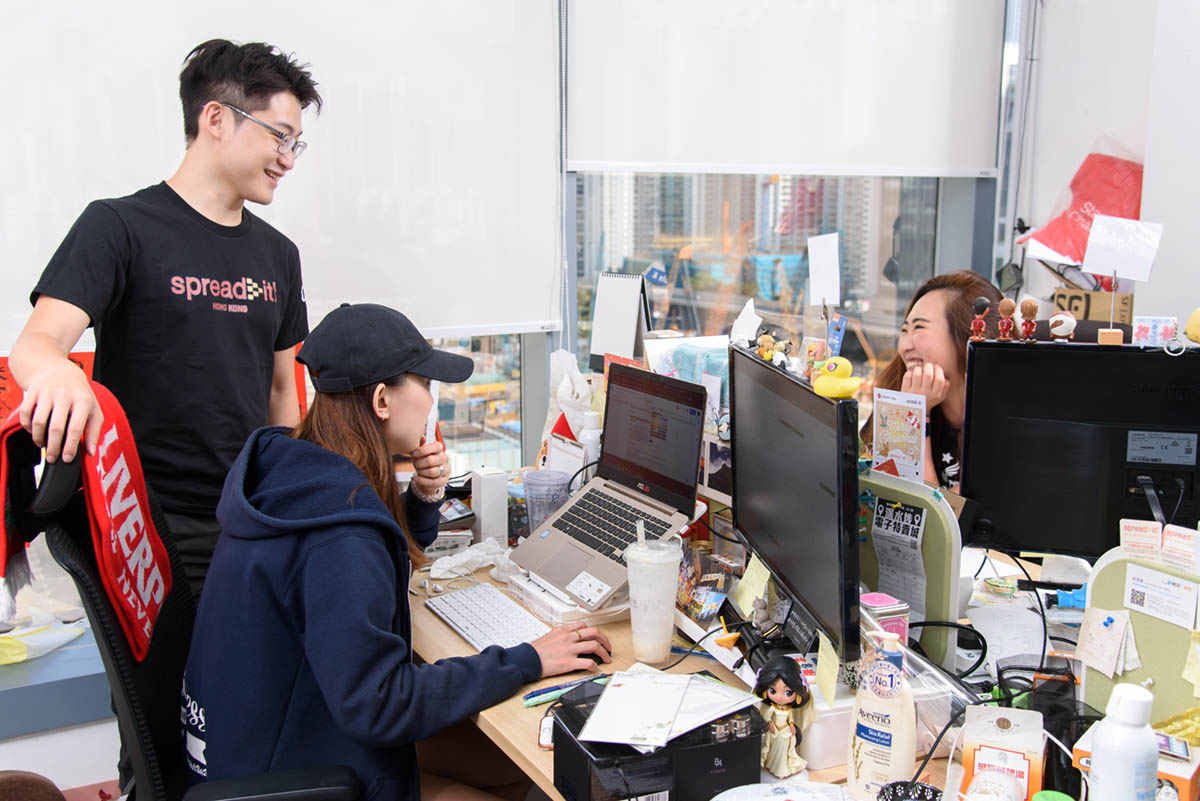
The most important trait for people keen to start a business that Timothy identifies is to never fear failure. “I see a lot of talented people who never even try to start their own business or project, because there are so many things that they think about before starting out and they hesitate. There is too little persistence and too much fear of failure, which means a lot of talented people can’t make a successful business,” he says.
This is not a fear that plagued Timothy, who, of the alumni featured on this year’s Forbes list, is the youngest. He believes, however, that “failure is inevitable”, and is proud that Spread-it has not succumbed yet, despite the many challenges faced. “Hopefully after 10 or 20 years, it is still around,” he says, elaborating that his vision is for Spread-it to evolve into an ecosystem with various platforms and apps to serve the influencer market.
The key to its success so far? “Run before you learn to walk. You can stop after you have run for a while. You can grow a lot quicker. We didn’t stop to think a lot of things through thoroughly. It’s how we start anything, including expanding overseas. Just keep running until you can’t. There will be terrible things that happen, but you learn from them. If you stop and think, you will never do things. Don’t think too much. Just go. Just keep running.”
Winston Wong, Qupital

Golf may be the sport most commonly associated with business, with deals inked on the green, but it was the basketball court where Winston bonded with co-founder Andy Chan, finding in him one of few peers familiar with factoring and trade finance at the time.
After graduating from HKUST, most of Winston’s Computer Engineering classmates went into the world of IT, but Winston had other ideas, instead indulging his interest in finance and joining a trade finance company. This involved significant travel in China where he saw how hot the online lending market was. Hong Kong did not have the same online lending platforms, despite the large number of SMEs in the city and the wide range of financial institutions including professional investors, family offices and banks. He presented a proposal to address this to his boss, but it was turned down. So instead, Winston turned to Andy Chan and the two began to discuss the idea, establishing Qupital just one month after they met.
“We didn’t have it all planned out at the beginning. But if you think too much about what might happen then you won’t take the first step,” says Winston. “My advice is don’t wait. There’s no perfect timing.”
If you think too much about what might happen then you won’t take the first step,” says Winston. “My advice is don’t wait. There’s no perfect timing.
Since Qupital launched in March 2016, it has grown rapidly, which presented its own challenges. A lack of standardization and automation as the company onboarded new SMEs meant that it was tough to scale. Investments in 2017 from Alibaba Entrepreneurs Fund and in March 2019 from CreditEase helped matters. But significant improvement occurred once Qupital pivoted towards the end of last year, identifying another market that would allow for standardization and automation. This was e-commerce, where all the data they needed to make lending decisions was already digitalized. For clients on third party platforms like Tmall, Amazon and eBay, data can be sourced and used. And so, Qupital moved from serving traditional SMEs to e-commerce clients, many of which lack assets and therefore find it hard to secure financing from banks. Qupital was able to use sales data to build credit models and secure funding.
The pivot had also come at a good time, just prior to the pandemic. “With the e-commerce model, we are able to see the latest sales, refund rates, order cancellation rates. Everything is transparent which makes lending decisions easier. Most of our clients still have year-on-year growth, particularly those selling home-related products, and are benefiting from the pandemic,” says Winston.
Of course, it hasn’t all been positive. Origination has been challenging as face-to-face meetings have been off the cards. “We refined our product so we don’t have to do face-to-face meetings and we have an online Know Your Customer process,” says Winston. “Also, because we have fully digitalized our client acquisition strategy, we hope this can be beneficial in the long run, not just the short term.”
The e-commerce market is large and growing, particularly in China. On Amazon, more than 40 percent of merchants are based there, with many lacking the external capital required to grow quickly. That’s where Qupital comes in – offering ease and efficiency.

“If you talk about our competitive advantage, we are fast,” says Winston. To secure financing from a bank can take three to four months, while Qupital can achieve it for e-commerce clients in three business days. “The data is already digitalized. We can just pull It from the API, plug it into our credit model and make a very fast credit decision. We have to do some manual processes on top, such as tracking company background and shareholders, but most operations can be done very efficiently because we have the data.”
Expansion is afoot, with new branches planned in Yiwu, Beijing, Guangzhou and Chengdu, adding to existing locations in Hong Kong, Shenzhen and Shanghai and growing the current team of around 60 members of staff. Then there is Southeast Asia to consider. With Amazon and eBay merchants already on board, there is potential for Lazada and Shopify, too, to name a few. “We believe that the data collected from different platforms is very similar so it’s easily replicated to different countries and to different platforms,” says Winston.
And there’s a bigger vision. “I want Qupital to become an e-commerce bank. We have financing, payments, deposits. We can help clients do transactions. We can add value to their businesses. We know the trends. So, I want to form a bank that offers other services. And hopefully we can become a unicorn after five years and finally reach IPO – but that is a longer story.”
Whatever happens, it’s not all about the destination. “Running a startup or your own business, it’s not the result that counts. It’s all about process. It’s what you gain on the journey that is invaluable and irreplaceable,” he says. “Those experiences and the skills you learn can be applied to future jobs. So, no matter whether your business is a success or a failure, the journey is the most important thing.”


